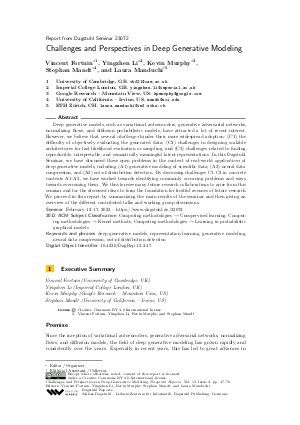Challenges and Perspectives in Deep Generative Modeling (Dagstuhl Seminar 23072)
Authors Vincent Fortuin, Yingzhen Li, Kevin Murphy, Stephan Mandt, Laura Manduchi and all authors of the abstracts in this report
-
Part of:
Issue:
Dagstuhl Reports, Volume 13, Issue 2
Part of: Volume: Dagstuhl Reports, Volume 13
Part of: Journal: Dagstuhl Reports (DagRep) - License:
 Creative Commons Attribution 4.0 International license
Creative Commons Attribution 4.0 International license
- Publication Date: 2023-10-09
File

PDF
DagRep.13.2.47.pdf
- Filesize: 1.91 MB
- 24 pages
Document Identifiers
Subject Classification
ACM Subject Classification
- Computing methodologies → Unsupervised learning
- Computing methodologies → Kernel methods
- Computing methodologies → Learning in probabilistic graphical models
Keywords
- deep generative models
- representation learning
- generative modeling
- neural data compression
- out-of-distribution detection
Metrics
- Access Statistics
-
Total Accesses (updated on a weekly basis)
0Document
0Metadata
Abstract
Deep generative models, such as variational autoencoders, generative adversarial networks, normalizing flows, and diffusion probabilistic models, have attracted a lot of recent interest. However, we believe that several challenges hinder their more widespread adoption: (C1) the difficulty of objectively evaluating the generated data; (C2) challenges in designing scalable architectures for fast likelihood evaluation or sampling; and (C3) challenges related to finding reproducible, interpretable, and semantically meaningful latent representations. In this Dagstuhl Seminar, we have discussed these open problems in the context of real-world applications of deep generative models, including (A1) generative modeling of scientific data, (A2) neural data compression, and (A3) out-of-distribution detection. By discussing challenges C1-C3 in concrete contexts A1-A3, we have worked towards identifying commonly occurring problems and ways towards overcoming them. We thus foresee many future research collaborations to arise from this seminar and for the discussed ideas to form the foundation for fruitful avenues of future research. We proceed in this report by summarizing the main results of the seminar and then giving an overview of the different contributed talks and working group discussions.
Cite As Get BibTex
Vincent Fortuin, Yingzhen Li, Kevin Murphy, Stephan Mandt, and Laura Manduchi. Challenges and Perspectives in Deep Generative Modeling (Dagstuhl Seminar 23072). In Dagstuhl Reports, Volume 13, Issue 2, pp. 47-70, Schloss Dagstuhl – Leibniz-Zentrum für Informatik (2023)
https://doi.org/10.4230/DagRep.13.2.47
BibTex
@Article{fortuin_et_al:DagRep.13.2.47,
author = {Fortuin, Vincent and Li, Yingzhen and Murphy, Kevin and Mandt, Stephan and Manduchi, Laura},
title = {{Challenges and Perspectives in Deep Generative Modeling (Dagstuhl Seminar 23072)}},
pages = {47--70},
journal = {Dagstuhl Reports},
ISSN = {2192-5283},
year = {2023},
volume = {13},
number = {2},
editor = {Fortuin, Vincent and Li, Yingzhen and Murphy, Kevin and Mandt, Stephan and Manduchi, Laura},
publisher = {Schloss Dagstuhl -- Leibniz-Zentrum f{\"u}r Informatik},
address = {Dagstuhl, Germany},
URL = {https://drops.dagstuhl.de/entities/document/10.4230/DagRep.13.2.47},
URN = {urn:nbn:de:0030-drops-191817},
doi = {10.4230/DagRep.13.2.47},
annote = {Keywords: deep generative models, representation learning, generative modeling, neural data compression, out-of-distribution detection}
}
